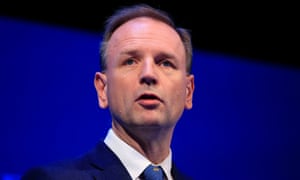Jeremy Hunt has broken the law by not forcing the NHS to ensure that patients receive hospital treatment within the stated maximum of 18 weeks, according to legal advice obtained by Labour.
The counsel’s opinion says the health secretary is acting illegally by not obliging NHS England to compel hospitals to treat the required 92% of patients within 18 weeks of being referred by their GP.
The advice, by James Goudie QC, is potentially embarrassing for Hunt as it draws attention to the NHS’s increasingly poor performance against key waiting time targets for A&E care, cancer treatment and ambulances’ responses to 999 calls, as well as the referral to treatment (RTT) requirement. It specifies that at least 92% of all those waiting for non-urgent hospital treatment, such as hip or knee replacement or cataract removals, should wait no more than 18 weeks.
Controversy erupted last month when Simon Stevens, NHS England’s chief executive, announced that he was relaxing the 18-week target so that under-pressure hospitals could focus on more important priorities, in a move critics said meant it was being scrapped. The Royal College of Surgeons accused the NHS of “waving the white flag” on the target and condemning patients already in pain to further suffering due to the extended delays they would now face to get surgery.
Labour peers commissioned the 12-page opinion from Goudie, a barrister specialising in public law and employment law at 11 King’s Bench Walk chambers in London. It says: “I am asked whether the SoS [secretary of state] acted unlawfully by failing to include the 92% RTT target in the mandate to NHS England for 2017-18. My answer is: ‘Yes’.”
It goes on to explain: “This is because the 2012 Regulations and the NHS constitution have the effect that this must be included. The annual mandate cannot lawfully be used to circumvent or undermine by omission the absolute statutory and sub-statutory requirements.”
The mandate is the detailed annual document in which the Department of Health spells out precisely what key priorities it wants NHS England to fulfil in the coming year.
Labour claimed Goudie’s advice showed the government’s NHS plans were “in total chaos”. The party planned to use a motion in the House of Lords on Thursday to try to force ministers to explain what it says is a fundamental breach of patients’ rights under the NHS constitution. Philip Hunt [no relation], Labour’s health spokesman in the Lords, will also challenge ministers to publish the legal advice they have taken surrounding the 18-week target.
“Tory plans for the NHS are in total chaos. Legal advice commissioned by Labour confirms that the government have acted unlawfully in failing to deliver the 18-week treatment target for patients,” said Jonathan Ashworth, the shadow health secretary.
“Almost 4 million people are now on waiting lists because of the neglect and underfunding of this Conservative government and now this year’s NHS mandate is at risk of legal challenge. The government are failing to deliver the standards of care to which NHS patients are legally entitled,” he added.
Labour is now considering what its next move should be in light of Goudie’s advice, including whether it should seek a judicial review to challenge the legality of Jeremy Hunt’s actions over the 18-week target. No decision has yet been made on possible legal avenues it may pursue.
But Hunt last night insisted that he had done nothing wrong and that he had ordered NHS England to start hitting the 92% target again, which hospitals have missed every month since March last year at a time when the total number of patients awaiting treatment has crept up to almost 4 million.
“We do not believe there is a case to answer,” a Conservative spokesman said.
“Indeed, we wholeheartedly reject any suggestion that the government is not committed to the 18-week target, and as the mandate itself clearly states, we are specifically requiring the NHS to return to delivering that standard,” he added. The NHS is now carrying out record numbers of operations and treating 5,000 more people a day than in 2010, the spokesman added.
Hospitals breached the 92% target for the first time in December 2015 since its introduction in 2010. After meeting it again in the next two months, performance slipped to 91.5% last March and has stayed below 92% since. It hit an all-time low of 89.7% last December. In February, a total of 367,094 patients waiting for treatment had already waited for more than 18 weeks, according to the most recent NHS data.
Tim Gardner, a senior policy fellow at the Health Foundation thinktank, said: “The failure of the NHS to treat patients within the 18-week target is a symptom of wider pressures on the system. NHS hospitals are running at or near capacity to cope with growing demand for emergency care, and this limits their ability to perform planned procedures. If funding pressures continue to increase, the NHS will increasingly be forced to make trade-offs to live within its means.
“The government must ensure there are adequate levels of investment to maintain good standards of care in every part of the health and care system.”
Hunt broke law by axing NHS 18-week treatment target, says Labour
